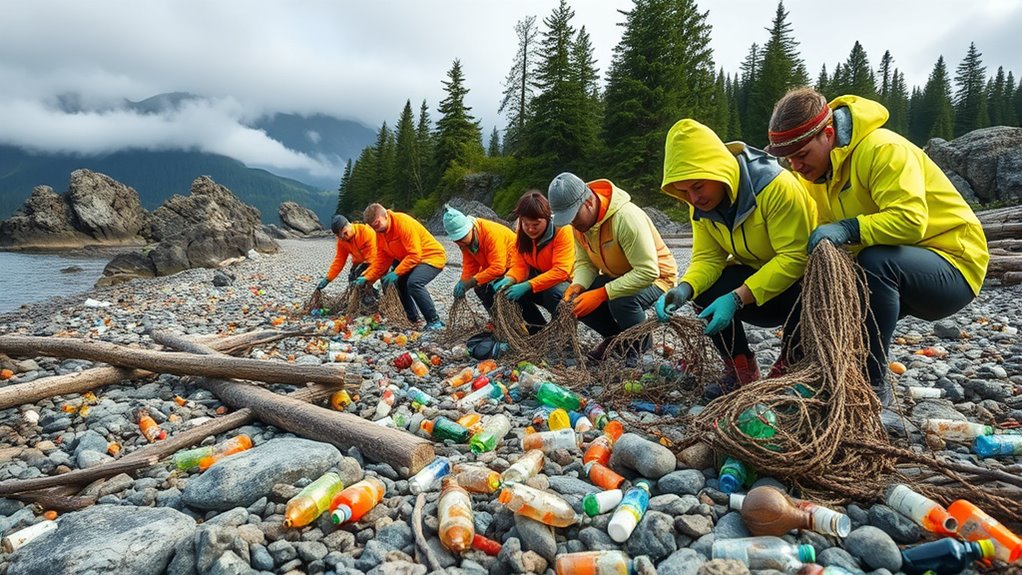Volunteering for ocean clean-ups in British Columbia lets you directly help protect marine environments and wildlife by removing harmful debris from beaches and shorelines. You’ll join community groups like The Great British Columbia Shoreline Cleanup and others, which coordinate events to raise awareness and restore ecosystems. Preparing properly and participating actively makes a real difference, and your involvement inspires others to take action—stay with us to discover more ways your efforts can support long-term ocean health.
Key Takeaways
- Join local organizations like The Great British Columbia Shoreline Cleanup or Surfrider Foundation Vancouver for scheduled beach cleanup events.
- Volunteer to remove marine debris, protect ecosystems, and support habitat restoration efforts along BC’s coastlines.
- Participate in community-led initiatives that promote environmental awareness and foster ocean conservation responsibility.
- Prepare with suitable gear such as gloves, sturdy shoes, sun protection, and trash bags for safe and effective clean-ups.
- Advocate for sustainable practices at home to complement volunteering efforts and ensure long-term ocean health.
Why Get Involved in Beach and Ocean Clean-Ups?
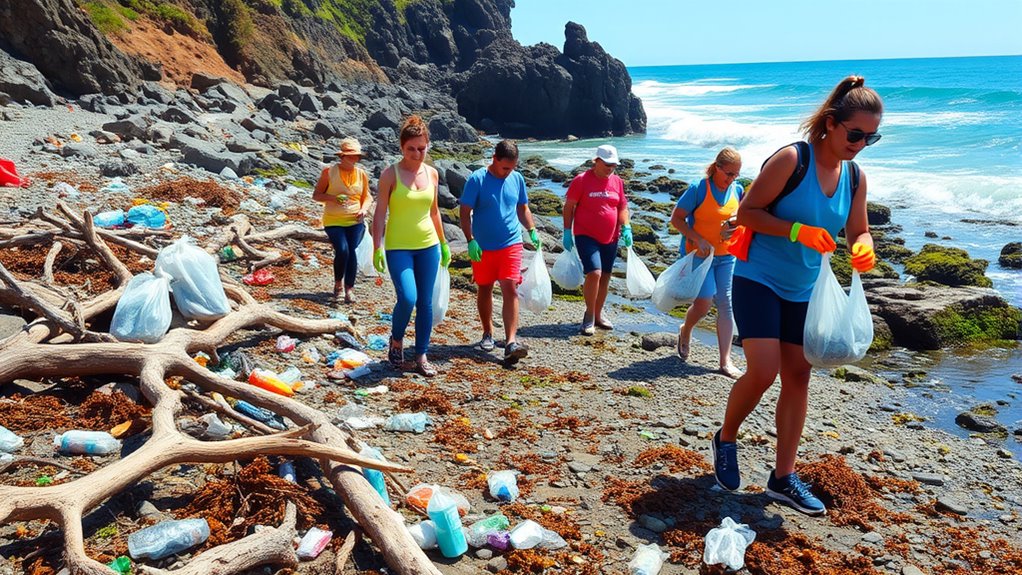
Getting involved in beach and ocean clean-ups allows you to make a direct, tangible difference in protecting our environment. Marine debris, especially plastic pollution, harms marine life and disrupts ecosystems. When you participate, you help remove harmful debris before it breaks down further or is ingested by animals. Plastic pollution is persistent, lasting for hundreds of years, and its presence threatens fish, birds, and other wildlife. Your efforts prevent these materials from contaminating the water and entering the food chain. Additionally, marine debris removal helps restore natural habitats and promotes the health of aquatic ecosystems. Cleaning up beaches keeps these areas safe and enjoyable for everyone. Volunteering gives you an active role in combating marine debris, reducing plastic pollution, and fostering healthier oceans. Your contribution matters in creating a cleaner, safer environment for future generations. Sound recording techniques and equipment play a crucial role in documenting and raising awareness about these environmental issues. Implementing effective communication strategies can further amplify the impact of awareness campaigns and motivate more community participation. Engaging in community outreach efforts can also help educate others about the importance of marine conservation and sustainable practices. Building awareness about the long-term effects of plastic pollution can motivate more people to participate in cleanup initiatives and adopt eco-friendly habits.
Key Organizations and Initiatives in BC
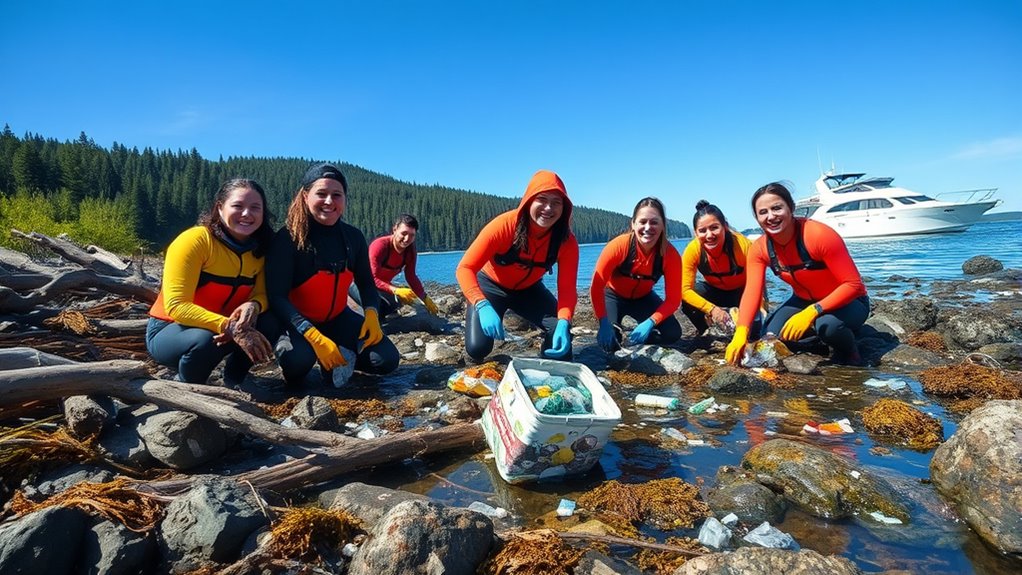
Many volunteer groups in BC are making a real difference by organizing cleanup events and raising awareness. These organizations often partner with local communities and businesses to expand their reach. By working together, they create impactful initiatives that protect BC’s oceans and beaches. Promoting safe and effective beginners guides for volunteers helps ensure their efforts are successful and sustainable. Utilizing volunteer resources can further enhance the efficiency and impact of these cleanup efforts. Understanding local divorce statistics can also help organizations tailor their outreach and engagement strategies effectively. Additionally, emphasizing community involvement fosters a greater sense of stewardship among participants, leading to more consistent and long-term environmental benefits. Incorporating AI security measures can also help safeguard sensitive data related to volunteer coordination and organization operations.
Volunteer Groups Making Impact
Numerous volunteer organizations and initiatives are actively making a difference in British Columbia’s efforts to clean up its oceans. These groups combat marine debris and plastic pollution through hands-on clean-up events and educational programs. Their impact is visible in beaches and coastal waters, reducing threats to marine life and ecosystems. Engaging the community in environmental sustainability can foster a sense of responsibility and connection to local environment efforts. Here are some key organizations making a difference:
- The Great British Columbia Shoreline Cleanup – mobilizes volunteers to remove marine debris from beaches and shorelines.
- Pacific Marine Conservation Society – organizes clean-ups and advocates for policies to reduce plastic pollution.
- Surfrider Foundation Vancouver Chapter – hosts regular ocean and shoreline clean-up events involving local communities. Promoting awareness of contrast ratio is crucial for long-term preservation efforts.
Partnerships and Local Initiatives
In British Columbia, key organizations and local initiatives play a crucial role in advancing ocean conservation efforts. You’ll find partnerships between environmental groups, government agencies, and Indigenous communities working together to shape marine policies that protect coastlines and marine life. These collaborations support critical ocean research, helping to identify pollution sources and develop effective clean-up strategies. Local initiatives often focus on community engagement, organizing shoreline clean-ups and educational programs that foster stewardship. By uniting efforts through these partnerships, BC creates a stronger, more coordinated response to ocean pollution. Your involvement can help amplify these initiatives, ensuring policies are informed by science and community needs. Incorporating sustainable practices into cleanup efforts further enhances their positive impact. Effective cost management strategies can also optimize resource allocation for these projects, maximizing their reach and effectiveness. Additionally, leveraging sound design techniques can improve educational outreach by creating engaging multimedia content that raises awareness about ocean health. Emphasizing community involvement is vital for building long-term commitment and ensuring the success of conservation projects. Stronger collaborative networks facilitate knowledge sharing and innovation, boosting overall impact. Together, these organizations and initiatives drive lasting change and inspire increased volunteer participation.
How to Prepare for a Volunteering Event
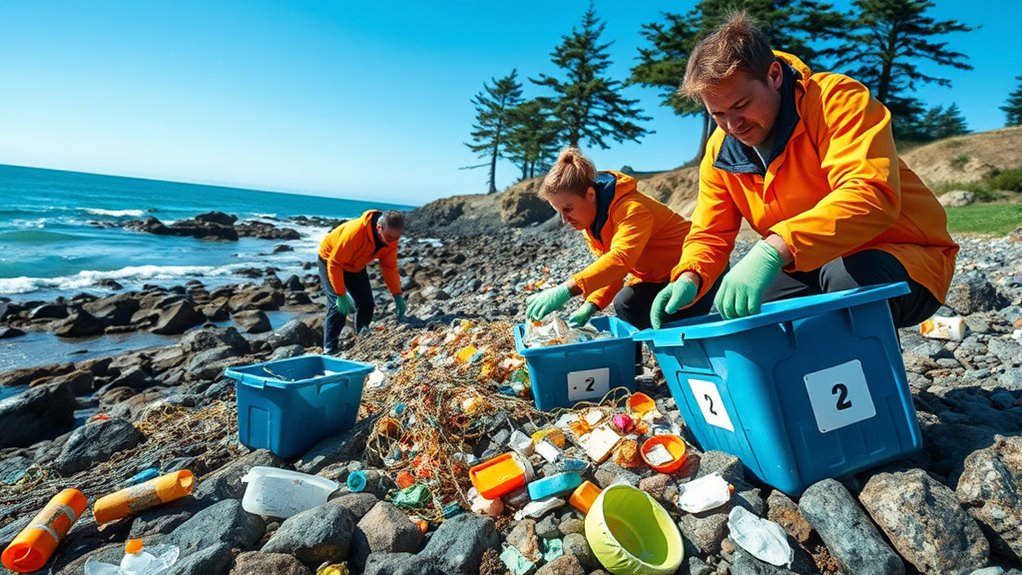
Before heading out, make sure you gather all the necessary supplies like gloves, trash bags, and sunscreen. Dress comfortably in weather-appropriate clothing to stay protected and mobile. Being prepared guarantees you can focus on making a positive impact without unnecessary distractions. Consider bringing exfoliating supplies, such as glycolic acid products, to help maintain healthy skin during outdoor activities.
Gather Necessary Supplies
To make certain you’re fully prepared for a beach cleanup, gather essential supplies like sturdy gloves, comfortable clothing, and a reusable trash bag. Using reusable supplies helps reduce waste and supports environmental sustainability. Safety gear is also vital to protect yourself from sharp objects and harmful debris. Before heading out, pack the following:
- Reusable supplies, such as trash bags and containers
- Safety gear like gloves and protective eyewear
- Personal essentials like water and sunscreen
Having these items ready ensures you can work efficiently and safely. Remember, well-prepared volunteers make a bigger impact, and using reusable supplies minimizes your environmental footprint during the cleanup. Proper preparation helps you focus on the task and enjoy the experience.
Dress for Comfort
Dressing comfortably is essential for a successful and enjoyable beach cleanup. You should wear weather-ready clothing that matches the forecast, whether it’s sun, rain, or wind. Lightweight, breathable layers work best, so you can stay comfortable throughout the event. Make sure to choose appropriate footwear, like sturdy closed-toe shoes or waterproof boots, to protect your feet from sharp objects and uneven surfaces. Avoid sandals or flip-flops, which don’t provide enough support or safety. Bring a hat, sunglasses, and sunscreen for sun protection, and consider a lightweight jacket if rain is predicted. Staying dressed for comfort helps you focus on the task and enjoy the experience while staying safe and dry.
The Impact of Community Efforts on Marine Ecosystems
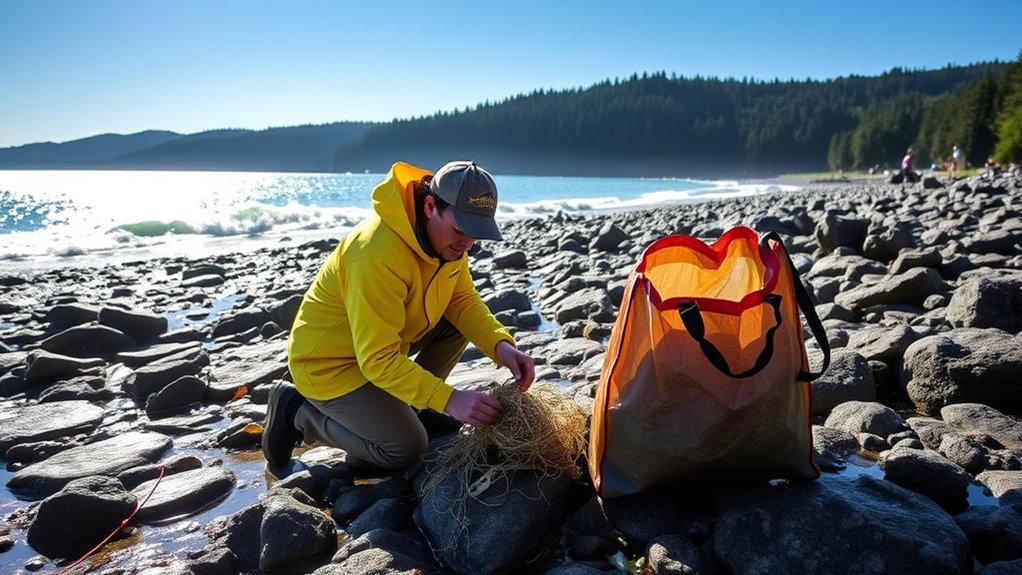
Community efforts in ocean clean-ups substantially boost marine ecosystems by removing harmful debris and reducing pollution. Your participation directly contributes to tackling marine debris, which threatens marine life and habitats. When you remove debris, you help restore ecosystems and promote healthier environments for fish, birds, and other marine creatures. Your actions support ecosystem restoration by preventing debris from sinking, spreading toxins, or entangling wildlife.
Here are three key impacts:
- Reduces marine debris, decreasing injury and death among marine species.
- Improves water quality, benefiting aquatic plants and animals.
- Enhances habitat health, encouraging biodiversity and balanced ecosystems.
Success Stories From Bc’S Clean-Up Campaigns
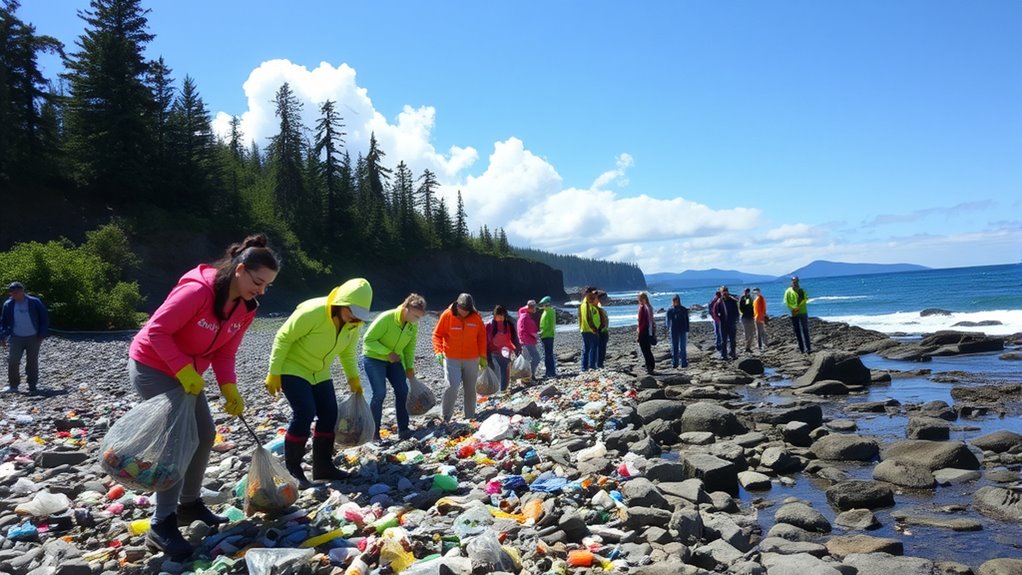
BC’s ocean clean-up campaigns have achieved remarkable results, turning community efforts into inspiring success stories. Volunteers have removed thousands of pounds of marine debris from beaches and coastal waters, directly improving marine ecosystems. One standout project involved a local group collecting debris from remote shoreline areas, preventing harmful materials from reaching sensitive habitats. These campaigns showcase how active ocean advocacy can lead to tangible change, raising awareness about the impact of marine debris. Their success encourages more communities to get involved, proving that collective action can make a significant difference. Each cleanup not only reduces pollution but also fosters a deeper connection to the ocean’s health, inspiring ongoing commitment. These stories highlight the power of community-driven initiatives to protect BC’s beautiful coastline.
Tips for Sustaining Marine Conservation at Home
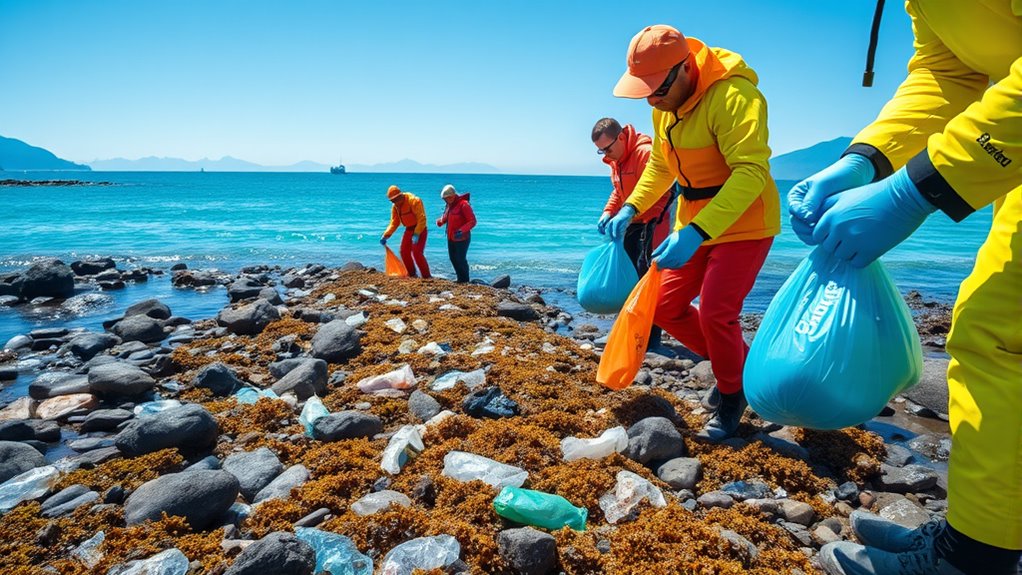
Even small changes at home can substantially contribute to marine conservation. By reducing marine debris and preventing pollution, you help protect local waterways and oceans. Start with these tips:
- Avoid single-use plastics like bottles and straws, and opt for reusable alternatives.
- Properly dispose of chemicals and hazardous waste to prevent pollution from reaching the ocean.
- Support eco-friendly products and ask companies about their sustainability practices.
These actions reduce marine debris and minimize pollution, making a direct impact on marine ecosystems. Small daily choices add up, helping to sustain marine conservation efforts at home. Your commitment to pollution prevention can inspire others and create a ripple effect toward healthier oceans.
Frequently Asked Questions
Are There Age Restrictions for Volunteering in Ocean Clean-Ups?
You might wonder about age restrictions for volunteer qualifications. Typically, most ocean clean-up events have age restrictions to make certain of safety, often allowing teenagers with adult supervision and sometimes younger children with parental consent. It’s crucial to check specific event guidelines, as some programs may set minimum age limits. Always verify the volunteer qualifications beforehand to make sure you’re eligible and prepared to contribute safely and effectively.
What Safety Gear Is Provided During Cleanup Events?
During cleanup events, you’ll be provided with safety equipment and protective gear to guarantee your safety. This typically includes gloves, safety vests, and sometimes goggles or masks, depending on the task. The organizers prioritize your safety, so they supply the necessary protective gear and instruct you on proper use. Always wear the provided safety equipment to stay protected from hazards like sharp objects or harmful debris while helping out.
Can I Volunteer if I Have No Prior Environmental Experience?
Imagine making a meaningful difference from your very first step—no experience needed. You can absolutely join as an entry-level participant, embracing beginner-friendly opportunities that welcome newcomers. Volunteering is about caring and learning, so don’t worry if you’re new to environmental work. Your enthusiasm matters more than expertise, and every effort helps protect our oceans. Immerse yourself confidently, knowing your contribution is valuable, no matter your background.
How Are Volunteers Assigned to Different Cleanup Locations?
When you ask how volunteers are assigned to different cleanup locations, it’s all about volunteer logistics and cleanup coordination. Organizers typically consider factors like your availability, location, and preferences. They then assign you to nearby or suitable sites to maximize impact. This process guarantees efficient cleanup efforts and makes sure volunteers are placed where they can contribute most effectively. So, your involvement helps keep the process smooth and impactful.
What Are the Environmental Benefits of Removing Microplastics?
Removing microplastics benefits the environment by reducing marine debris that harms marine life. When you help eliminate microplastics, you support healthier ecosystems and protect biodiversity. Microplastics can be ingested by marine animals, disrupting their development and reproduction. By removing these tiny pollutants, you contribute to improved ecosystem health, ensuring safer habitats for fish, seabirds, and other marine species. Your efforts help maintain the balance of our oceans and protect future generations.
Conclusion
By joining these clean-up efforts, you become a essential thread in the vibrant tapestry of BC’s marine life. Your actions ripple outward, transforming beaches from forgotten battlegrounds into sparkling sanctuaries. Remember, each piece of trash you remove is a brushstroke restoring nature’s masterpiece. Keep your passion alive, for together, you’re the gentle guardians guiding our oceans back to their shimmering, untamed beauty—one act of kindness at a time.

